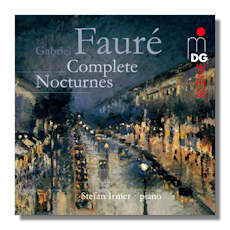
The Internet's Premier Classical Music Source
Related Links
- Fauré Reviews
- Latest Reviews
- More Reviews
-
By Composer
-
Collections
DVD & Blu-ray
Books
Concert Reviews
Articles/Interviews
Software
Audio
Search Amazon
Recommended Links
Site News
 CD Review
CD Review
Gabriel Fauré

The Complete Nocturnes
- Nocturne #1 in E Flat minor, Op. 33 #1 (1875)
- Nocturne #2 in B Major, Op. 33 #2 (1880)
- Nocturne #3 in A Flat Major, Op. 33 #3 (1882)
- Nocturne #4 in E Flat Major, Op. 36 (1884)
- Nocturne #5 in B Flat Major, Op. 37 (1884)
- Nocturne #6 in D Flat Major, Op. 63 (1894)
- Nocturne #7 in C Sharp minor, Op. 74 (1898)
- Nocturne #8 in D Flat Major, Op. 84 #8 (1902)
- Nocturne #9 in B minor, Op. 97 (1908)
- Nocturne #10 in E minor, Op. 99 (1908)
- Nocturne #11 in F Sharp minor, Op. 104 #1 (1913)
- Nocturne #12 in E minor, Op. 107 (1915)
- Nocturne #13 in B minor, Op. 119 (1921)
Stefan Irmer, piano
Dabringhaus & Grimm MDG6181626-2 79min
The 13 Nocturnes by Gabriel Fauré" (1845-1924) were written over a period of nearly 50 years. This chronological span in composition shows a development not only in the composer's style, but also in the radical changes music underwent between the end of the 19th and beginning of the 20th centuries. Fauré" attached great importance to piano music, so it is no wonder that he often turned to the instrument to reveal his innermost thoughts and emotions.
He wrote his first Nocturnes, Op. 33, 36 and 37 in the early 1870's, and these already betray a fully mature composer at the height of his powers, although all five are strictly Romantic pieces belonging to the world of the salons. From #6 onwards written in 1894, the music became uncompromisingly modern and these particular works can be seen pertaining more to the concert hall than anywhere else. The last five exemplify Fauré's late style, which is compressed and economical and goes to the limits of tonality.
While the influences of Field and Chopin are discernible, Fauré's Nocturnes have little in common with the Romantic language (apart from the first 5) created by his predecessors. As his son Philippe wrote, the compositions of his father were not necessarily based on nightly reveries and emotions, but are lyrical pieces generating passion, anguish or forlorn sadness such as the 11th.
Stefan Irmer is a great advocate of this sublime repertoire, and his immaculately virtuosic interpretations open up a whole new world to the listener, a world that is fascinatingly diverse as it is hauntingly alluring. This is a disc that no admirer of the composer should be without. Superb sound quality and detailed documentation complete a sumptuous MD&G issue that I unreservedly recommend.
Copyright © 2011, Gerald Fenech





















